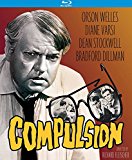| Reviews & Columns |
|
Reviews DVD TV on DVD Blu-ray 4K UHD International DVDs In Theaters Reviews by Studio Video Games Features Collector Series DVDs Easter Egg Database Interviews DVD Talk Radio Feature Articles Columns Anime Talk DVD Savant Horror DVDs The M.O.D. Squad Art House HD Talk Silent DVD
|
DVD Talk Forum |
|
|
| Resources |
|
DVD Price Search Customer Service #'s RCE Info Links |
|
Columns
|
|
|
Compulsion (1959)
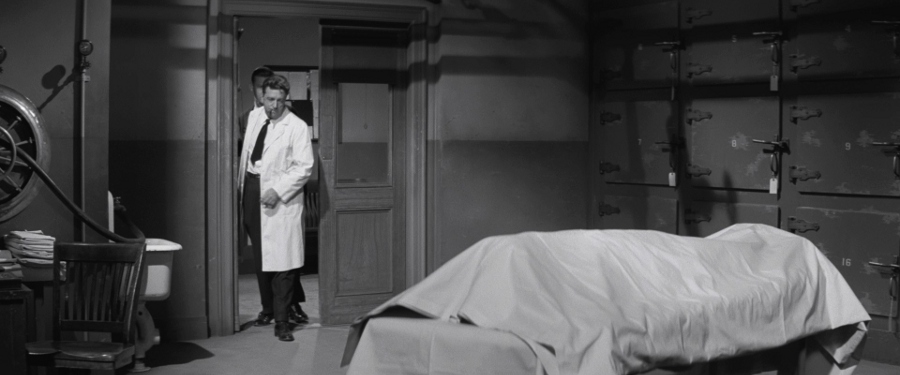 As one of several fictionalized accounts of the infamous 1924 kidnapping and murder of Bobby Franks by Nathan Leopold and Richard Loeb---and itself an adaptation of Meyer Levin's 1956 novel of the same name---Richard Fleischer's Compulsion (1959) offers an early blueprint for the modern, full-bodied "true crime" drama later surpassed by more striking films like In Cold Blood. It's obviously limited by a willingness to pull plenty of punches, suggesting many elements of the lurid case without going for the throat...and most of what it does show hasn't aged well, more likely to make first-time viewers chuckle instead of feel intimidated. Despite some of these glaring faults---which, to be fair, are inevitable byproducts of the era---Compulsion also has its fair share of strengths: a handful of solid performances led by top-billed supporting actor Orson Welles (as defense attorney Jonathan Wilk, based on Clarence Darrow), fantastic cinematography by William C. Mellor (A Place in the Sun, The Diary of Anne Frank), and more. Though it's based on a highly publicized case that entered the history books more than three decades before Levin's novel, Fleischer's film also manages to maintain intrigue during key moments: a discovery of rare glasses that don't belong to our victim, the interview---and eventual interrogation---of Leopold and Loeb stand-ins Judd Steiner (Dean Stockwell) and Artie Struass (Bradford Dillman), and the trial of both men, just after Welles' Jonathan Wilk arrives more than an hour into this 103-minute film. It's a huge moment during this oddly-paced production, which gets right down to business by following Steiner and Strauss during a theft at the University of Chicago campus and late-night getaway where they intentionally almost run over a drunk man. The murder of young Paulie Kessler happens soon after; it's never shown and only revealed in fragmented detail, shifting perspective away from the highly intelligent, completely amoral law students and towards that of a more clinical approach. It's an extremely tricky balance that Compulsion almost pulls off, yet the film's relatively short running time doesn't allow enough space to explore some of the case's more interesting details. The film's occasionally detached and documentary-like attitude is also subverted by its heavy-handed preaching in the final scenes---and though research suggests that Welles' impassioned anti-death penalty remarks are practically verbatim to Darrow's in 1924, this doesn't make for a particularly balanced experience in hindsight. Compulsion is still worth watching as a well-meaning early step in the burgeoning "true crime" genre, and the prolific Fleischer would continue his exploration of similar territory in later films The Boston Strangler (1968) and 10 Rillington Place (1971). Though it hasn't held up particularly well in some regards, the committed performances, terrific visuals, and subject matter give it a much different feeling than Alfred Hitchcock's more insular Rope (1948) or the polarizing Swoon (1992), just two of several films either based on or obviously inspired by the real-life case. Kino delivers Compulsion on Blu-ray for eager American fans, easily beating Fox's 2006 DVD edition but falling short of the higher marks set by a Region B Blu-ray released more than a year ago.
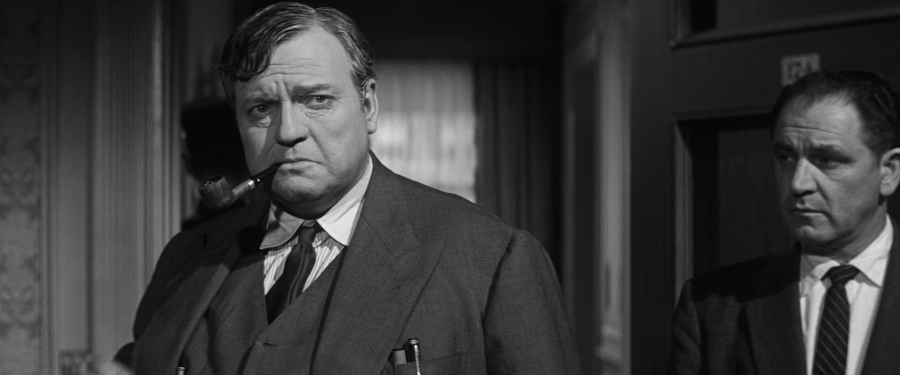

Presented in its original 2.35:1 aspect ratio, this 1080p transfer of Compulsion looks very good with a few mild reservations. Image detail is generally strong with crisp textures, especially during outdoor sequences. Dirt and debris is scarce, aside from a few occasional spots near the beginning, and the relatively high bitrate doesn't lead to any obvious compression artifacts. Nighttime sequences don't fare as well: shadow detail is limited and there are moments of persistent flicker; the opening scenes also look artificially brightened with poor black/gamma levels and even a few moments of noticeable banding. But once that glaring hurdle is cleared, the visuals are overall quite strong and represent an obvious upgrade over Fox's 2006 DVD edition.
The audio is presented in its DTS-HD Master Audio 2.0 format with a pleasing amount of channel separation and even depth on several occasions. Dialogue and background effects are adequately balanced and don't fight for attention, while a few more "social" scenes (a live music performance early on, for example) boast surprisingly strong dynamic levels. Overall, it's an impressive track that makes Compulsion sound a decade or two younger than it really is. Dialogue is very crisp and clear, but it's nice to see optional English subtitles during the main feature (they're small, but at least set within the image frame).
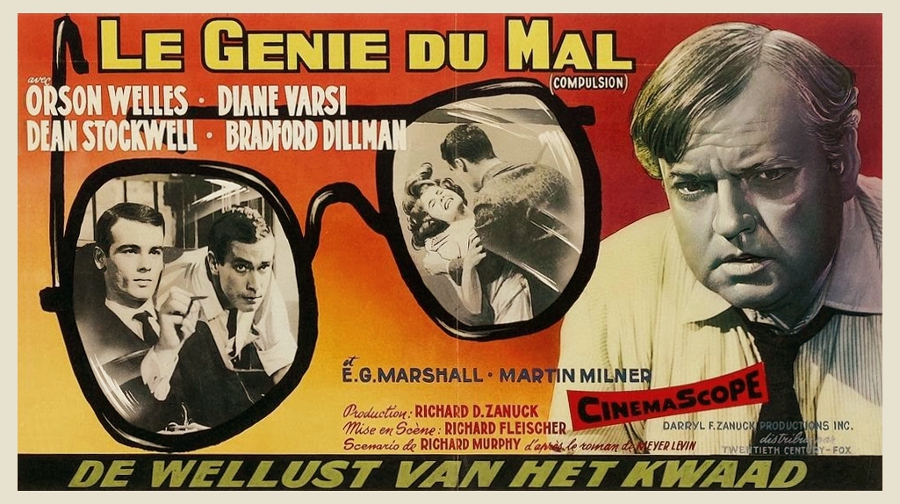
We also get the Theatrical Trailer (1 minute) and three for other Kino titles. In contrast, Fox's 2006 DVD only had two trailers for the main feature, so this is a modest step up (but still lacking in the historical department, given Compulsion's source material).
 Based on a well-researched novel by Meyer Levin concerning the infamous 1924 Leopold and Loeb murder case, Richard Fleischer's Compulsion aims high with terrific cinematography, documentary-like intentions, and a top-billed
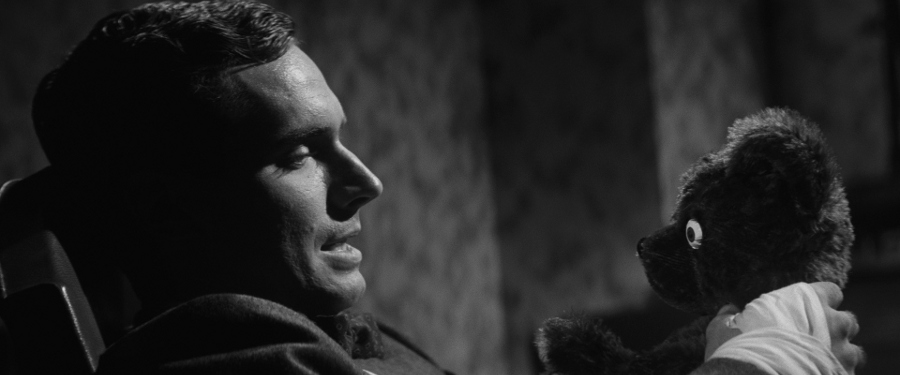 |
|
| Popular Reviews |
| Sponsored Links |
|
|
| Sponsored Links |
|
|
| Release List | Reviews | Shop | Newsletter | Forum | DVD Giveaways | Blu-Ray | Advertise |
|
Copyright 2024 DVDTalk.com All Rights Reserved. Legal Info, Privacy Policy, Terms of Use,
Manage Preferences,
Your Privacy Choices | |||||||









